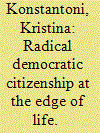| Srl | Item |
| 1 |
ID:
147876


|
|
|
|
|
| Summary/Abstract |
In this article, we portray the Indian experience of mobility and inequality since the early 1990 s. First, we address the question of heightening Indian inequality. Inequality has tended to rise substantially and can be understood in terms of the growing distance among social classes. Second, we present an analysis of migration in class terms and examine whether it has contributed to a reduction or heightening of inequality. Migrants as a group, across classes, have tended to do better than non-migrants at source and equivalent classes at destination. This finding is somewhat curious and counter-intuitive, and we explain it through the logic of endowments that these different groups possess. The better performance of the migrants has only further heightened the tendencies towards increasing inequality. Third, we analyse intergenerational occupational mobility to see if there is evidence for greater social mobility through the heightened presence of markets in our midst. Broadly, in an overall context of heightening inequality in India, it appears as if the forces fostering upward social mobility have not dominated over the forces that perpetuate social distance.
|
|
|
|
|
|
|
|
|
|
|
|
|
|
|
|
| 2 |
ID:
184069


|
|
|
|
|
| Summary/Abstract |
Current approaches to radical democratic citizenship seek to open up new spaces for political action and politicise ordinariness. However, a question remains as to the extent to which current radical approaches to citizenship include one of the most overlooked groups: very young children. This article focuses on radical democratic citizenship and early childhood (0 to 8 years old), where rights are often violated and activism is not always recognised, particularly in everyday public spaces. Drawing on critical reflections from recent research projects focusing on young children’s rights in everyday public spaces, I argue that radical democratic citizenship in early childhood can be conceptualised through intergenerational and intersectional activism and through an analysis of children’s ordinary political acts which render visible processes of radical change.
|
|
|
|
|
|
|
|
|
|
|
|
|
|
|
|